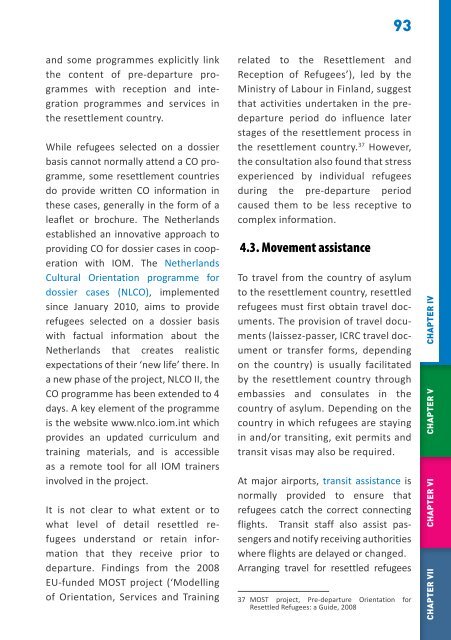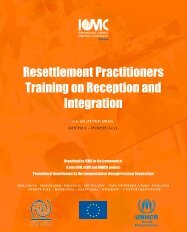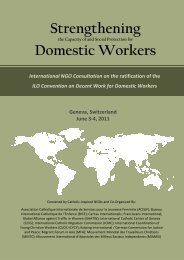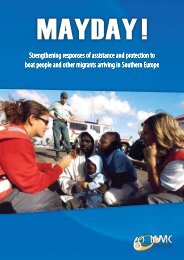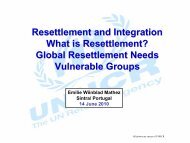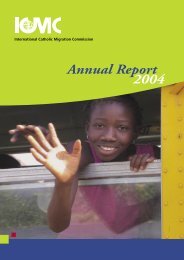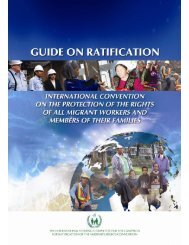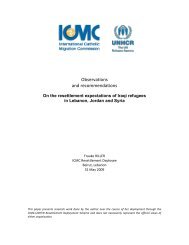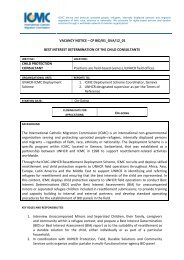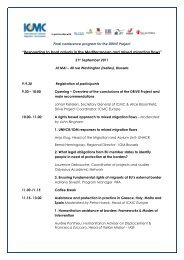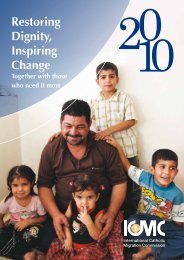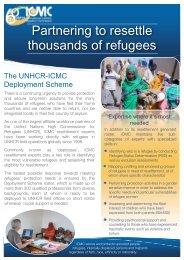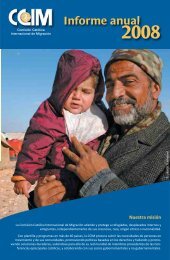ICMCEUROPE WelcometoEurope.pdf (5.89 MB)
ICMCEUROPE WelcometoEurope.pdf (5.89 MB)
ICMCEUROPE WelcometoEurope.pdf (5.89 MB)
Create successful ePaper yourself
Turn your PDF publications into a flip-book with our unique Google optimized e-Paper software.
93<br />
and some programmes explicitly link<br />
the content of pre-departure programmes<br />
with reception and integration<br />
programmes and services in<br />
the resettlement country.<br />
While refugees selected on a dossier<br />
basis cannot normally attend a CO programme,<br />
some resettlement countries<br />
do provide written CO information in<br />
these cases, generally in the form of a<br />
leaflet or brochure. The Netherlands<br />
established an innovative approach to<br />
providing CO for dossier cases in cooperation<br />
with IOM. The Netherlands<br />
Cultural Orientation programme for<br />
dossier cases (NLCO), implemented<br />
since January 2010, aims to provide<br />
refugees selected on a dossier basis<br />
with factual information about the<br />
Netherlands that creates realistic<br />
expectations of their ‘new life’ there. In<br />
a new phase of the project, NLCO II, the<br />
CO programme has been extended to 4<br />
days. A key element of the programme<br />
is the website www.nlco.iom.int which<br />
provides an updated curriculum and<br />
training materials, and is accessible<br />
as a remote tool for all IOM trainers<br />
involved in the project.<br />
It is not clear to what extent or to<br />
what level of detail resettled refugees<br />
understand or retain information<br />
that they receive prior to<br />
departure. Findings from the 2008<br />
EU-funded MOST project (‘Modelling<br />
of Orientation, Services and Training<br />
related to the Resettlement and<br />
Reception of Refugees’), led by the<br />
Ministry of Labour in Finland, suggest<br />
that activities undertaken in the predeparture<br />
period do influence later<br />
stages of the resettlement process in<br />
the resettlement country. 37 However,<br />
the consultation also found that stress<br />
experienced by individual refugees<br />
during the pre-departure period<br />
caused them to be less receptive to<br />
complex information.<br />
4.3. Movement assistance<br />
To travel from the country of asylum<br />
to the resettlement country, resettled<br />
refugees must first obtain travel documents.<br />
The provision of travel documents<br />
(laissez-passer, ICRC travel document<br />
or transfer forms, depending<br />
on the country) is usually facilitated<br />
by the resettlement country through<br />
embassies and consulates in the<br />
country of asylum. Depending on the<br />
country in which refugees are staying<br />
in and/or transiting, exit permits and<br />
transit visas may also be required.<br />
At major airports, transit assistance is<br />
normally provided to ensure that<br />
refugees catch the correct connecting<br />
flights. Transit staff also assist passengers<br />
and notify receiving authorities<br />
where flights are delayed or changed.<br />
Arranging travel for resettled refugees<br />
37 MOST project, Pre-departure Orientation for<br />
Resettled Refugees: a Guide, 2008<br />
CHAPTER IV<br />
CHAPTER VI CHAPTER V<br />
CHAPTER VII


